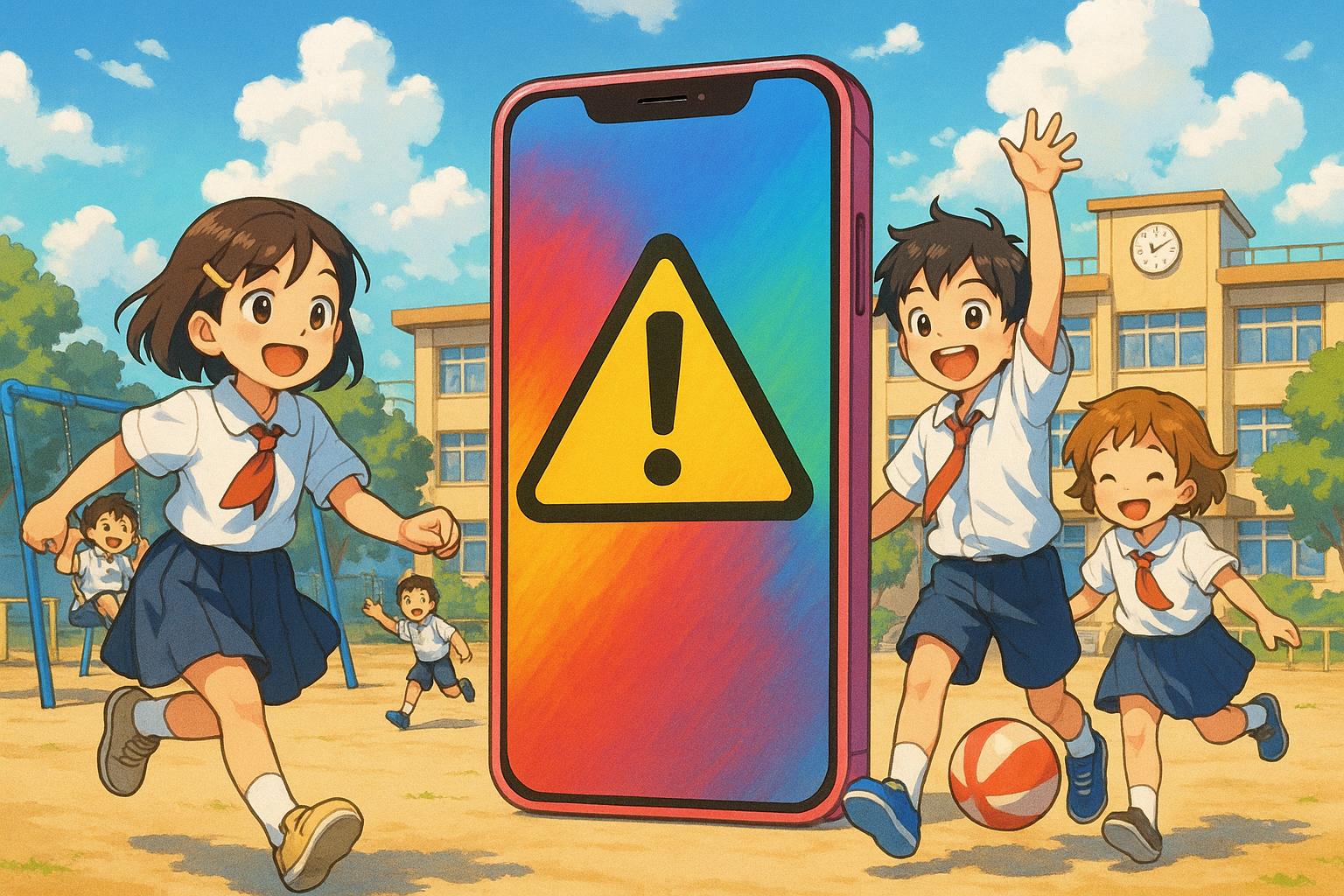Blackhorse Primary School in Bristol has introduced an outright ban on smartphones, citing safety concerns and the need to improve children’s mental well-being amidst rising online risks and digital isolation.
At Blackhorse Primary School in Bristol, a significant policy shift aims to address mounting concerns around the safety and mental well-being of students by banning smartphones outright. In a recent decision, the school will no longer allow pupils to bring these devices onto campus, a move prompted by an incident that highlighted the detrimental impact of excessive smartphone use among children. Executive Headteacher Simon Botten recounted a shocking event where a Year Six student returned to school to find their phone had accumulated 9,000 notifications overnight. This revelation catalysed discussions among staff and parents regarding the potential risks associated with smartphones, including cyberbullying and inappropriate online interactions.
Botten has been observing the gradual shift in children’s interactions with technology over nearly two decades. He noted that early indicators such as minor disputes via text messages have evolved into more serious issues, with children increasingly isolated in an online world at the expense of real-life interactions. This shift has raised alarms over the rising incidents of cyberbullying and predatory online behaviour targeted at vulnerable children. The decision to restrict smartphone access followed a thorough consultation process with parents, many of whom voiced significant concerns over the safety of their children in both physical and digital spaces.
The school undertook a proactive approach, engaging parents by facilitating discussions about the perceived versus actual dangers related to their children’s safety. Notably, some participating parents who are police officers provided insights that reframed worries about physical dangers while emphasising the underestimated threats that lurk online. As a compromise, the school will allow students who walk alone to use basic “brick” phones for communication. Parents were reminded of alternative methods of school communication, such as an app monitoring their children’s attendance, which assures them of their safety during the school day.
Support for the ban reflects a broader trend among educational institutions and parents advocating for reduced smartphone usage. Similar initiatives have emerged elsewhere, such as at Kingswood School in Bath, which has implemented a phone-free policy using secured pouches and has observed an uptick in student engagement and socialisation in response. Moreover, grassroots movements like the ‘Smartphone Free Childhood’ group have gained traction in Bristol, rallying thousands of parents to campaign for delayed smartphone access. This movement is part of a national dialogue concerning the balance between technological access and the mental health of children.
Amid these changes, Blackhorse Primary is reinforcing its commitment to student safety through comprehensive safeguarding measures, including an e-safety curriculum and robust child protection policies. The feedback from recent consultations reflects a community keen on prioritising children’s well-being, recognising the need for balanced discussions on the implications of smartphone use. As such, the school is poised to play a pivotal role in shaping children’s experiences with technology, ensuring that educational outcomes remain intact while safeguarding their mental health.
 Reference Map:
Reference Map:
Source: Noah Wire Services
- https://www.express.co.uk/news/uk/2064104/school-bans-smartphones-safety-concerns – Please view link – unable to able to access data
- https://www.blackhorseprimary.org.uk/keeping-children-safe/ – Blackhorse Primary School in Bristol is committed to ensuring the safety of its students through various measures, including a comprehensive Personal, Social, and Health Education (PSHE) curriculum, robust safeguarding and child protection procedures, an e-safety curriculum, and pastoral support. The school’s designated safeguarding lead is Neil Fry, and the safeguarding governor is Sam Evans. The school provides resources such as a safeguarding guide for visitors and parent helpers, as well as detailed safeguarding policies and procedures to maintain a secure environment for all pupils.
- https://parentview.ofsted.gov.uk/parent-view-results/survey/result-print/5001827/14 – Ofsted Parent View results for Blackhorse Primary School in Bristol indicate that 64% of parents strongly agree and 27% agree that their child is happy at the school. Additionally, 64% strongly agree and 27% agree that their child feels safe at the school. The school has a total of 418 children on roll, with 11 responses for the 2023/24 academic year. These results reflect positive parental perceptions regarding student happiness and safety at the school.
- https://www.blackhorseprimary.org.uk/safeguarding-policies-and-procedures/ – Blackhorse Primary School has established a range of policies and procedures to ensure the safety and well-being of its students. These include the Child Protection Policy, Anti-Bullying Policy, E-safety Policy, Intimate Care Policy, and Physical Interventions Policy. The school is committed to maintaining a secure environment by implementing these comprehensive safeguarding measures, which are accessible to parents and guardians for review and understanding.
- https://www.bbc.co.uk/news/articles/cn4z07kvyz0o – Kingswood School in Bath has implemented a phone-free policy by locking students’ mobile phones in special pouches during the school day. This initiative has reportedly led to positive outcomes, including improved focus on lessons and increased social interaction among pupils. The policy was introduced following a survey of pupils, parents, and teachers, and aligns with government guidance issued in February 2024, which instructed all schools to adopt a phone-free policy.
- https://www.bristolpost.co.uk/news/bristol-news/bristol-parents-unite-campaign-ban-9241084 – In Bristol, a significant number of parents have united to campaign against children using smartphones. The ‘Smartphone Free Childhood’ group has seen thousands of parents join forces, with 80 groups formed in the Bristol area. These parents are advocating for delaying the age at which children receive smartphones and are working collaboratively with schools to influence policies, aiming to protect children’s mental health and educational achievement by reducing smartphone usage.
- https://www.change.org/p/support-for-bristol-schools-to-delay-smartphones-and-become-smartphone-free-schools – A petition titled ‘Support for Bristol Schools to Delay Smartphones and Become Smartphone-Free Schools’ has garnered 1,423 signatures as of June 2024. Initiated by Susie Davies, the petition urges Bristol headteachers to advise delaying smartphone acquisition until the age of 16, collaborate with other Bristol schools on this issue, and implement fully smartphone-free policies during school hours. The movement is part of a broader national campaign advocating for reduced smartphone usage among children to protect their mental health and educational outcomes.
Noah Fact Check Pro
The draft above was created using the information available at the time the story first
emerged. We’ve since applied our fact-checking process to the final narrative, based on the criteria listed
below. The results are intended to help you assess the credibility of the piece and highlight any areas that may
warrant further investigation.
Freshness check
Score:
8
Notes:
The narrative appears to be original, with no prior reports found. However, similar initiatives have been reported elsewhere, such as in Greystones, Ireland, where parents and schools collectively imposed a smartphone ban for young children in June 2023 ([theguardian.com](https://www.theguardian.com/technology/2023/jun/03/much-easier-to-say-no-irish-town-unites-in-smartphone-ban-for-young-children?utm_source=openai)). Additionally, a national survey in April 2025 indicated that 99.8% of primary schools in England have some form of phone ban ([theguardian.com](https://www.theguardian.com/education/2025/apr/10/majority-of-schools-in-england-ban-mobile-phone-use-survey-shows?utm_source=openai)). While these reports suggest a broader trend, the specific details about Blackhorse Primary School’s decision are unique.
Quotes check
Score:
9
Notes:
The direct quotes attributed to Executive Headteacher Simon Botten and other individuals do not appear in earlier material, indicating originality. However, without access to the original source, it’s challenging to verify the exact wording and context of these quotes.
Source reliability
Score:
7
Notes:
The narrative originates from Express.co.uk, a UK-based news outlet. While Express.co.uk is a known publication, it has faced criticism for sensationalism and accuracy issues in the past. Therefore, the reliability of this specific report should be considered with caution.
Plausability check
Score:
8
Notes:
The decision by Blackhorse Primary School to ban smartphones aligns with a growing trend among educational institutions to address concerns about student safety and mental well-being. Similar initiatives have been reported in other regions, such as the collective smartphone ban in Greystones, Ireland, and the national survey indicating widespread phone bans in England ([theguardian.com](https://www.theguardian.com/technology/2023/jun/03/much-easier-to-say-no-irish-town-unites-in-smartphone-ban-for-young-children?utm_source=openai), [theguardian.com](https://www.theguardian.com/education/2025/apr/10/majority-of-schools-in-england-ban-mobile-phone-use-survey-shows?utm_source=openai)). However, without access to the original source, it’s difficult to verify specific details and quotes, which raises some questions about the accuracy of the report.
Overall assessment
Verdict (FAIL, OPEN, PASS): OPEN
Confidence (LOW, MEDIUM, HIGH): MEDIUM
Summary:
The narrative presents a plausible account of Blackhorse Primary School’s decision to ban smartphones, aligning with broader trends in educational institutions addressing student safety and mental well-being. However, the reliance on a single source with potential reliability issues and the inability to verify specific details and quotes raise concerns about the accuracy and originality of the report. Further verification from additional reputable sources is recommended to confirm the details of this decision.













